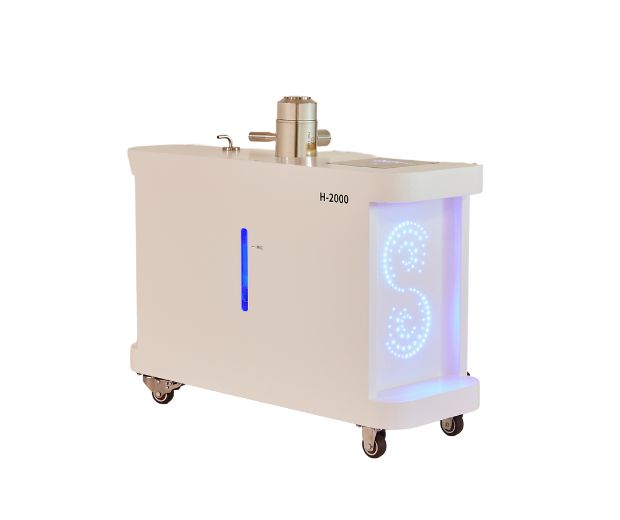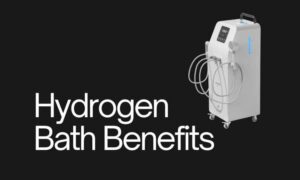Hydrogen inhalation therapy is a non-invasive treatment that involves breathing in molecular hydrogen gas, typically a mixture of 66% hydrogen and 33% oxygen, through a nasal cannula or mask. This gas blend is delivered by a specialized hydrogen inhalation machine that produces high-purity hydrogen on demand.
Quick Fact: Molecular Hydrogen is over 100 times smaller than vitamin C. This allows it to reach places in the body where larger antioxidant molecules can’t.
Because hydrogen is the smallest and lightest molecule, it diffuses rapidly throughout the body. It easily crosses cell membranes and even the blood-brain barrier, allowing it to reach areas of inflammation or oxidative stress where other antioxidants cannot go. This makes it a fast-acting and efficient therapy that provides full-body support with every breath.
And this is the reason why hydrogen is now being used in hospitals, wellness centers, and homes worldwide as a safe, non-invasive therapy that targets the root causes of many chronic conditions. In this article, we’ll explore 8 powerful reasons why more people are turning to this natural therapy every day.
Hydrogen Inhalation Benefits
1. Powerful Antioxidant Protection
One of hydrogen’s most well-documented benefits is its role as a selective antioxidant. Unlike synthetic antioxidants that may disrupt normal cellular processes, molecular hydrogen specifically targets the most damaging free radical: the hydroxyl radical (•OH). This radical is known to damage DNA, proteins, and lipids, key contributors to aging and disease.
- Selective action: Hydrogen neutralizes harmful radicals without affecting beneficial ones involved in immune function or cellular signaling.
- Fast cellular response: Inhaled hydrogen is quickly absorbed, offering real-time protection during high-stress or recovery periods.
What makes hydrogen unique is that it targets only the bad guys. It doesn’t interfere with beneficial reactive oxygen species (ROS) that the body needs for immune defense and cell signaling.
A study in Nature Medicine demonstrated that hydrogen inhalation significantly reduced brain injury in rats caused by ischemia-reperfusion, showing direct evidence of its potent, selective antioxidant effects.
2. Reduces Inflammation at the Source
Chronic inflammation is a silent driver behind many diseases such as arthritis, asthma, autoimmune disorders, and even heart disease. When left unchecked, it becomes a silent contributor to premature aging and organ dysfunction.
Hydrogen therapy works by downregulating inflammatory pathways. It reduces the expression of cytokines such as interleukin-6 (IL-6), tumor necrosis factor-alpha (TNF-α), and NF-κB, all of which are involved in perpetuating inflammation.
- Respiratory benefits: Shown to reduce inflammation in lung tissue, aiding conditions like COPD, asthma, and long COVID.
- Whole-body impact: Useful in systemic inflammatory conditions, including skin issues, gut inflammation, and allergies.
3. Supports Brain and Neurological Health
Hydrogen’s ability to cross the blood-brain barrier gives it unique neuroprotective advantages. By reducing oxidative damage and calming inflammation in the brain, it shows potential in supporting both cognitive health and neurological recovery.
- Applications include: Stroke rehabilitation, Alzheimer’s disease, Parkinson’s, and traumatic brain injuries.
- Mental benefits: Some users report improved mental clarity, focus, and emotional stability with regular use.
A study in Scientific Reports found that patients recovering from out-of-hospital cardiac arrest had better neurological outcomes when treated with hydrogen gas inhalation.
4. Enhances Cellular Energy and Mitochondrial Function
Mitochondria, the energy factories of our cells, are highly vulnerable to oxidative damage. When mitochondria are stressed by toxins, infections, or aging, your body experiences fatigue, slower healing, and metabolic imbalance.
Hydrogen therapy protects mitochondrial membranes and DNA, helping them work more efficiently. It supports mitochondrial function by:
- Protecting mitochondrial membranes and DNA from oxidative damage.
- Improving ATP production, which translates into more energy and faster recovery.
- Supporting healthier metabolism and reducing insulin resistance.
Use cases: Individuals with chronic fatigue syndrome, fibromyalgia, or metabolic disorders often find relief through hydrogen therapy.
5. Supports Lung and Cardiovascular Health
Hydrogen therapy is particularly beneficial for the lungs and heart, two systems constantly exposed to oxidative stress, whether from pollutants, poor circulation, or chronic inflammation.
For the Lungs:
- Reduces inflammation in the airways and alveoli, improving oxygen exchange.
- Aids in recovery from COPD, asthma, bronchitis, and post-viral lung damage.
- May reduce respiratory distress in long COVID and pneumonia cases.
For the Heart:
- Enhances blood vessel flexibility by increasing nitric oxide (NO) availability.
- Helps regulate blood pressure and circulation.
- Reduces oxidative damage to heart muscle tissue.
In Japan, hydrogen inhalation is being tested as a supportive therapy for patients recovering from cardiac surgery.
6. Promotes Longevity and Anti-Aging
Hydrogen helps maintain redox balance, which is the body’s way of managing oxidation and reduction reactions. When this balance is disrupted, it accelerates aging and disease. Hydrogen helps restore this balance, slowing cellular wear and tear.
Key Anti-Aging Benefits:
- Delays cellular senescence, the process where cells lose function with age.
- Reduces telomere shortening, a marker of biological aging.
- Supports skin elasticity, collagen production, and reduced age-related inflammation.
Anti-aging clinics and wellness spas are incorporating hydrogen inhalation into beauty, detox, and vitality programs to promote cellular rejuvenation from the inside out.
7. Aids in Recovery and Athletic Performance
Athletes are turning to hydrogen inhalation to reduce post-workout soreness and speed up recovery. Hydrogen reduces muscle inflammation and supports cellular repair, making it ideal for active individuals or those undergoing physical therapy.
It helps athletes and active individuals by:
- Reducing muscle damage markers like creatine kinase (CK).
- Lowering lactic acid buildup, which reduces soreness and improves endurance.
- Enhancing recovery speed, allowing for more frequent, effective workouts.
Many sports clinics now offer hydrogen inhalation as part of IV therapy, cryotherapy, or performance recovery sessions. (source)
8. May Improve Sleep and Stress Response
Hydrogen also plays a subtle yet important role in balancing the nervous system. Studies suggest it may reduce cortisol (the stress hormone) and promote neurotransmitter balance, helping with sleep quality and emotional regulation.
Hydrogen therapy may:
- Lower cortisol levels promote a calm, balanced mood.
- Support melatonin production, enhancing deep sleep cycles.
- Help regulate the autonomic nervous system, improving your response to daily stress.
Conclusion
Hydrogen inhalation therapy offers a unique, science-backed way to support healing, recovery, energy, and longevity. With its ability to reduce harmful oxidative stress, calm inflammation, protect the brain, and rejuvenate the body at a cellular level, hydrogen gas is proving to be a gentle yet powerful tool in modern preventive care.
Whether you’re managing a chronic illness, recovering from intense workouts, or simply striving for a healthier aging process, hydrogen inhalation offers a safe, non-toxic, and highly effective solution.
Ready to experience the benefits of hydrogen inhalation?
Explore Huelight’s trusted, high-purity hydrogen inhalation systems that bring hospital-grade therapy into your home, backed by science, designed for everyday wellness.














